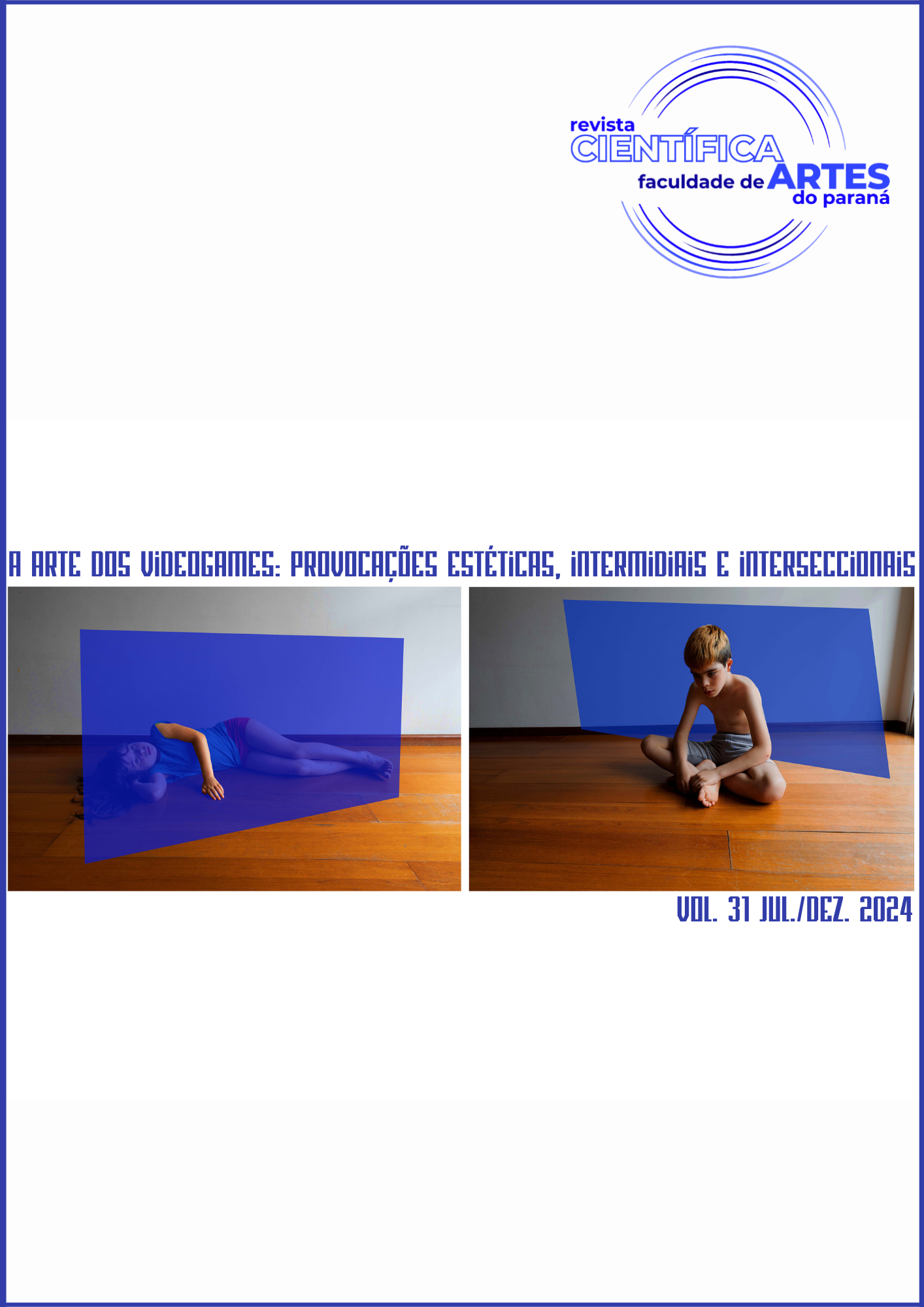NOSTALGIA IN CUPHEAD (2017)
DOI:
https://doi.org/10.33871/19805071.2024.31.2.9420Keywords:
Videogame, Cuphead, Game StudiesAbstract
This text has discussions based on the study of the game Cuphead (2017), using a qualitative approach to collect data from the game. The study starting point is a brief bibliographic review about game studies and our perspective is the notion that games are reading objects, as postulated by Chartierian studies. Cuphead was read in order to understand how its syncretic text affects the player, provoking the emotion of nostalgia. At the end of the research undertaken, it was observed that the game is an amalgam of image and sound references from an imagined 1930s, organized without a critical look at the racial prejudice present in the collages that originated the cartoons of the called golden decade of the United States animation.
Downloads
References
BOGOST, Ian. “Crítica de videogames comparativa” Gobira, Pablo; Santaella, Lúcia (org.). Jogos Digitais: suas realidades lúdicas e múltiplas. LPF/ UEMG, 2021.
CERTEAU, Michel de. A invenção do cotidiano: artes de fazer. Petrópolis: Vozes, 2008.
CHARTIER, Roger. Do livro à leitura. In: ______ (Org.). Práticas de leitura. Tradução de Cristiane Nascimento. São Paulo: Estação Liberdade, 1996.p. 77-105.
CHARTIER, Roger. A ordem dos livros: leitores, autores e bibliotecas na Europa entre os séculos XIV e XVIII. 2. ed. Tradução de Mary Del Priore. Brasília: Editora Universidade de Brasília, 1998.
GOBIRA, Pablo. “O uso dos jogos digitais para a literacia digital das artes digitais”. Gobira, Pablo; Santaella, Lúcia (org.). Jogos Digitais: suas realidades lúdicas e múltiplas. LPF/ UEMG, 2021.
GUIDO, Bruna Maria Alexandre; FARIA JUNIOR, Vitor Celso Melo de; SOUSA, Euller Augusto de; ANDRADE, Marina de Souza; MEDEIROS, Daiany de Lima; FECHINE, Mariana Quirino. “Análise do jogo Cuphead com base nas animações norte-americanas dos anos 30: narrativas e técnicas dos desenhos, inferências histórias e adaptações às mecânicas de jogabilidade atuais”. In: XXI Congresso de Ciências da Comunicação na Região Nordeste, 2019, São Luís - MA. IJ: Comunicação Audiovisual. São Paulo: Intercom: Sociedade Brasileira de Estudos Interdisciplinares, 2019. p. 1-12.
LEMOS, Adriana Falqueto. Castlevania Symphony of the Night e a Invenção do gótico. Tese (Doutorado em Letras) – Programa de Pós-Graduação em Letras, Universidade Federal do Espírito Santo. Vitória, p. 209. 2018.
LEMOS, Adriana Falqueto. Literatura e videogame: Como pesquisar e analisar videogames dentro dos Estudos Literários [recurso eletrônico]. 1. ed. Vitória: Pedregulho, 2020.
LEMOS, Adriana Falqueto; VERMES, Viviana Mónica. De Piranesi a Castlevania: O Castelo Gótico Sob a Égide da Ruína Nostálgica. In: Graziela Frainer Knoll e Fabrício Tonetto Londero. (Org.). Upgrade: jogos, entretenimento e cultura. 1ed.São Paulo: Pimenta Cultural, 2021, v. 1, p. 190-212.
MAKAI, Péter Kristóf. “Video Games as Objects and Vehicles of Nostalgia”. Humanities, v. 7, 2018. https://doi.org/10.3390/h7040123
ROSEN, Charles. A Geração Romântica. São Paulo: Edusp - Editora da Universidade de São Paulo, 2000.
RUBIM, Rossanna dos Santos Santana. Leitura literária e tecnologias de informação e comunicação: um estudo de caso. Vitória, ES: Edifes, 2018.
SAMMOND, Nicholas. Birth of an Industry: Blackface Minstrelsy and the Rise of American Animation. Durham: Duke University Press, 2015.
SCHUELKE, Patricia. “Nostalgia, Race, and the Music of Cuphead”. Master’s thesis, Bowling Green State University, 2022. Disponível em: http://rave.ohiolink.edu/etdc/view?acc_num=bgsu1647626494164004 Acesso em: 16 jun. 2024.
StudioMDHR. The Art of Cuphead. Dark Horse Books, 2020.
Downloads
Published
How to Cite
Issue
Section
License
The authors retain the copyright, when licensing their production in Revista Científica/FAP, which is licensed under a Creative Commons license. When submitting the article, and upon acceptance, the author assigns his copyright for publication in that journal.
Readers can download, print and use the articles published in the journal, as long as there is always an explicit mention of the author (s) and the Revista Científica/FAP, no changes to the original work are allowed. When submitting an article to Revista Científica/FAP and after its being accepted for publication, the authors allow, without remuneration, to pass the following rights to the Journal: the first edition rights and the authorization for the editorial team to transfer, according to their judgment, this article and its metadata to indexing and reference services.


